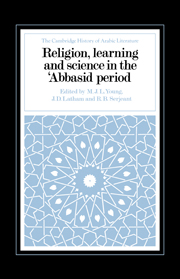Book contents
- Frontmatter
- Epigraph
- Contents
- List of plates
- Editorial preface
- List of abbreviations
- Map Literary, political and religious centres in the ʿAbbasid period
- 1 Sunnī theology
- 2 Shīʿī theological literature
- 3 Ibāḍī theological literature
- 4 Quranic exegesis
- 5 The prose literature of Ṣufism
- 6 Philosophical literature
- 7 Arabic lexicography
- 8 Arabic grammar
- 9 Islamic legal literature
- 10 Administrative literature
- 11 Arabic biographical writing
- 12 History and historians
- 13 Faṭimid history and historians
- 14 Mathematics and applied science
- 15 Astronomy
- 16 Astrology
- 17 Geographical and navigational literature
- 18 The literature of Arabic alchemy
- 19 Arabic medical literature
- 20 Al-Kindī
- 21 Al-Rāzī
- 22 Al-Fārābī
- 23 Ibn Sīnā
- 24 Al-Bīrūnī and the sciences of his time
- 25 Al-Ghazālī
- 26 Christian Arabic literature in the ʿAbbasid period
- 27 Judaeo-Arabic literature
- 28 The translation of Greek materials into Arabic
- 29 Didactic verse
- Glossary
- Bibliography
- Index
19 - Arabic medical literature
Published online by Cambridge University Press: 05 July 2014
- Frontmatter
- Epigraph
- Contents
- List of plates
- Editorial preface
- List of abbreviations
- Map Literary, political and religious centres in the ʿAbbasid period
- 1 Sunnī theology
- 2 Shīʿī theological literature
- 3 Ibāḍī theological literature
- 4 Quranic exegesis
- 5 The prose literature of Ṣufism
- 6 Philosophical literature
- 7 Arabic lexicography
- 8 Arabic grammar
- 9 Islamic legal literature
- 10 Administrative literature
- 11 Arabic biographical writing
- 12 History and historians
- 13 Faṭimid history and historians
- 14 Mathematics and applied science
- 15 Astronomy
- 16 Astrology
- 17 Geographical and navigational literature
- 18 The literature of Arabic alchemy
- 19 Arabic medical literature
- 20 Al-Kindī
- 21 Al-Rāzī
- 22 Al-Fārābī
- 23 Ibn Sīnā
- 24 Al-Bīrūnī and the sciences of his time
- 25 Al-Ghazālī
- 26 Christian Arabic literature in the ʿAbbasid period
- 27 Judaeo-Arabic literature
- 28 The translation of Greek materials into Arabic
- 29 Didactic verse
- Glossary
- Bibliography
- Index
Summary
None of the sciences received more patronage among the Arabs than that of medicine – a discipline which they acquired from the Greeks and in which they excelled most. The Arabic adage states: “al-ʿilm cilmān, ʿilm yarfaʿ wa-ʿilm yanfaʿ, fa-ʾl-rāfiʿ al-dān wa-ʿl-nāfiʿ al-ṭibb” (“science is twofold, that which exalts and that which is useful – that which exalts is religion, and that which is useful is medicine”). Islam not only put medicine on a high level but also conferred the title of ḥakīm (wise) on medical practitioners, a term used by Muslims up to the present day in many areas. The association of medicine with religious learning is noteworthy, and is a pleasing feature of Muslim life; for according to a Tradition of the Prophet: “al-ʿilm cilmān, ʿilm al-fiqh li-ʾl-adyān wa-ʿilm al-ṭibb li-ʾl-abdān” (“science is twofold, theology and medicine”).
Scientific medicine, from the death of Galen to the birth of William Harvey, was kept alive by the vigorous scḣools of the Byzantines and the Arabs. While among the neo-Latins in Europe, labouring under ignorance and superstition, it almost ceased to exist, and among the later Byzantines surviving in suspended animation rather than growth, under the rising crescent in the East we have to admire one of the most remarkable phases of the history of medicine, that which developed within the culture of Arabian civilization.
- Type
- Chapter
- Information
- Religion, Learning and Science in the 'Abbasid Period , pp. 342 - 363Publisher: Cambridge University PressPrint publication year: 1990
- 3
- Cited by



